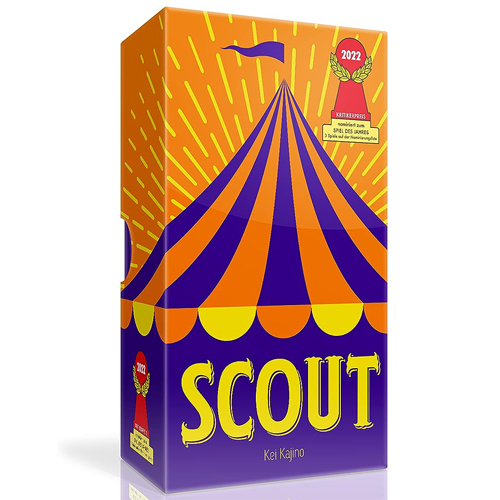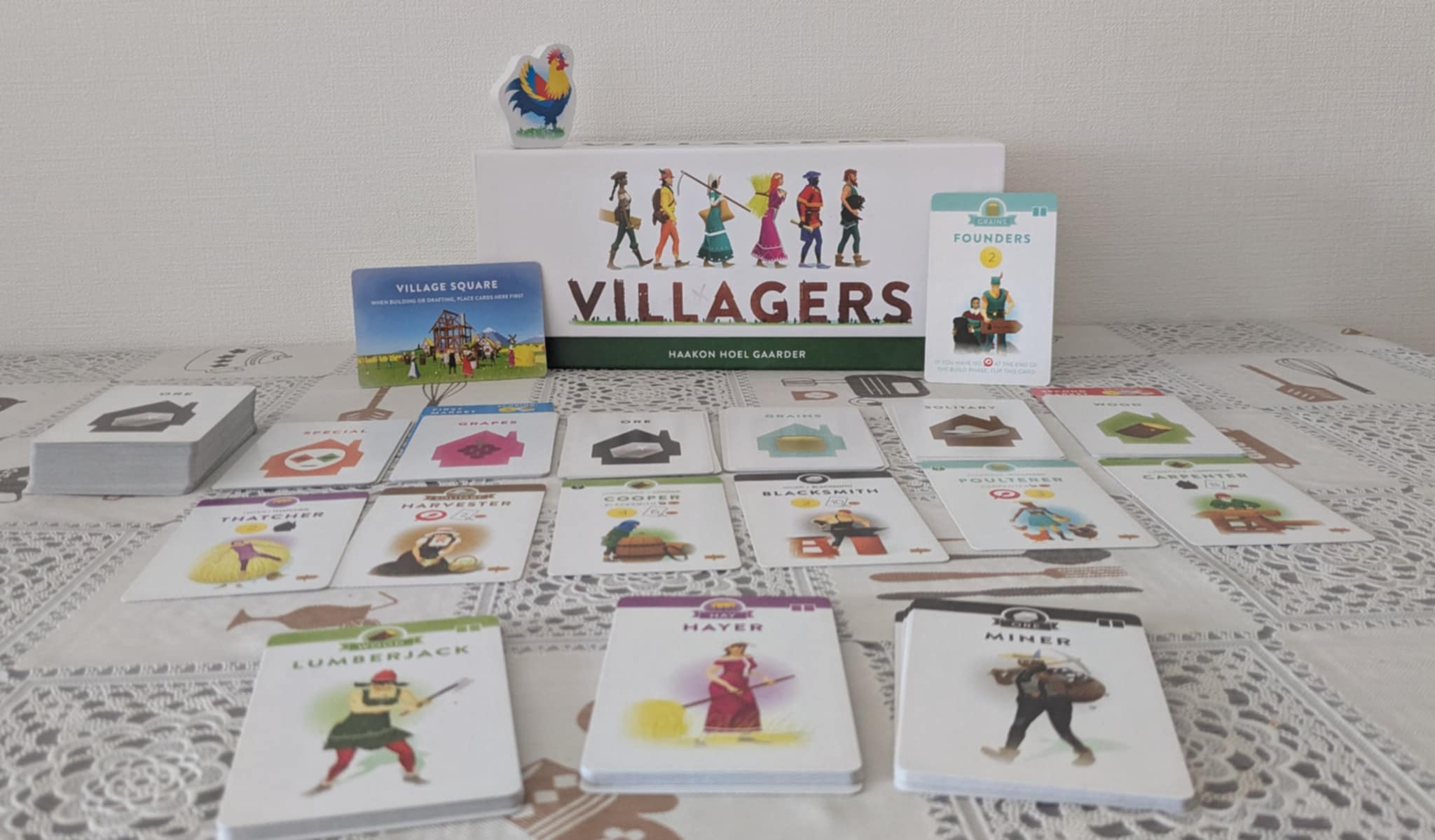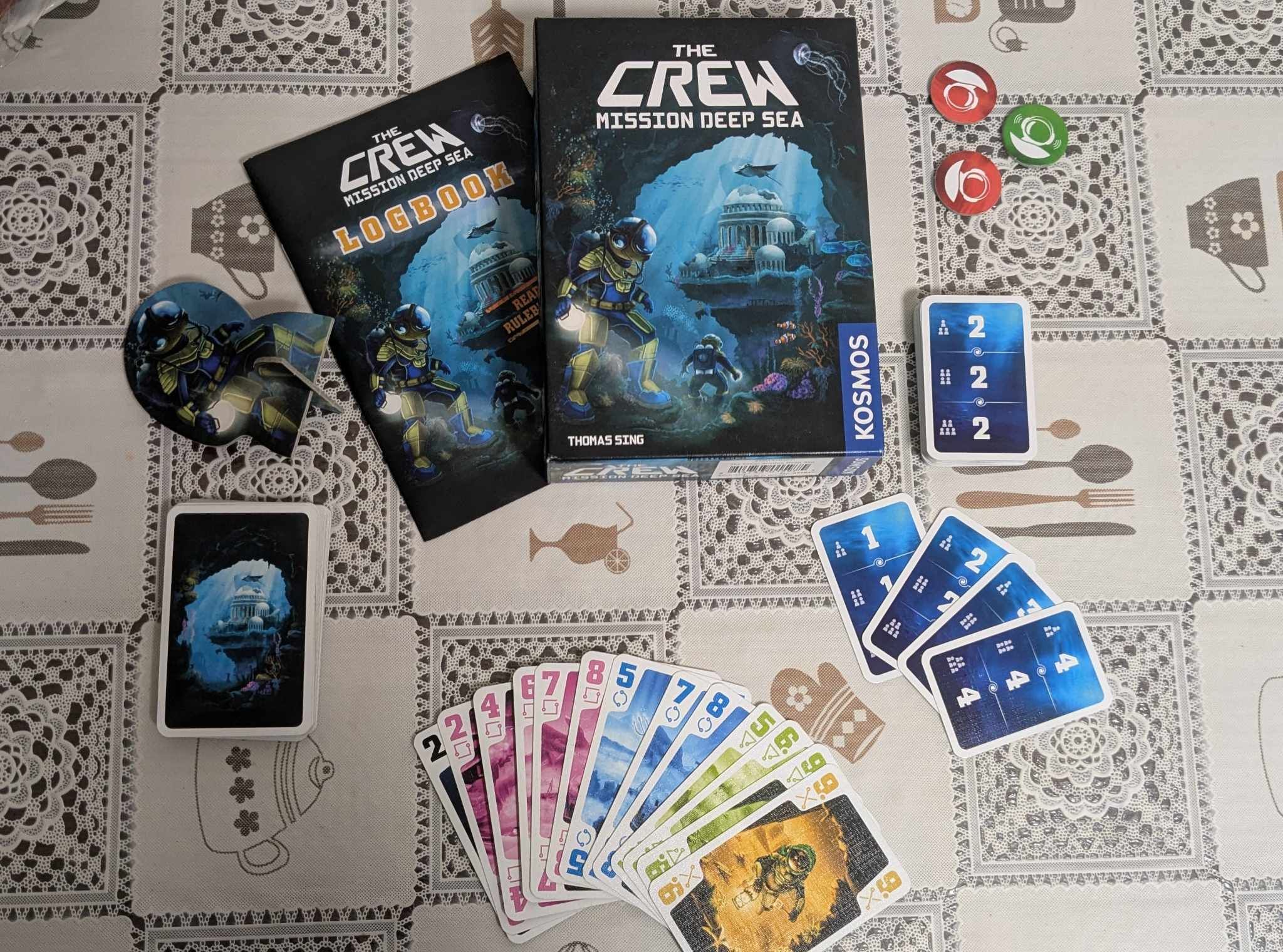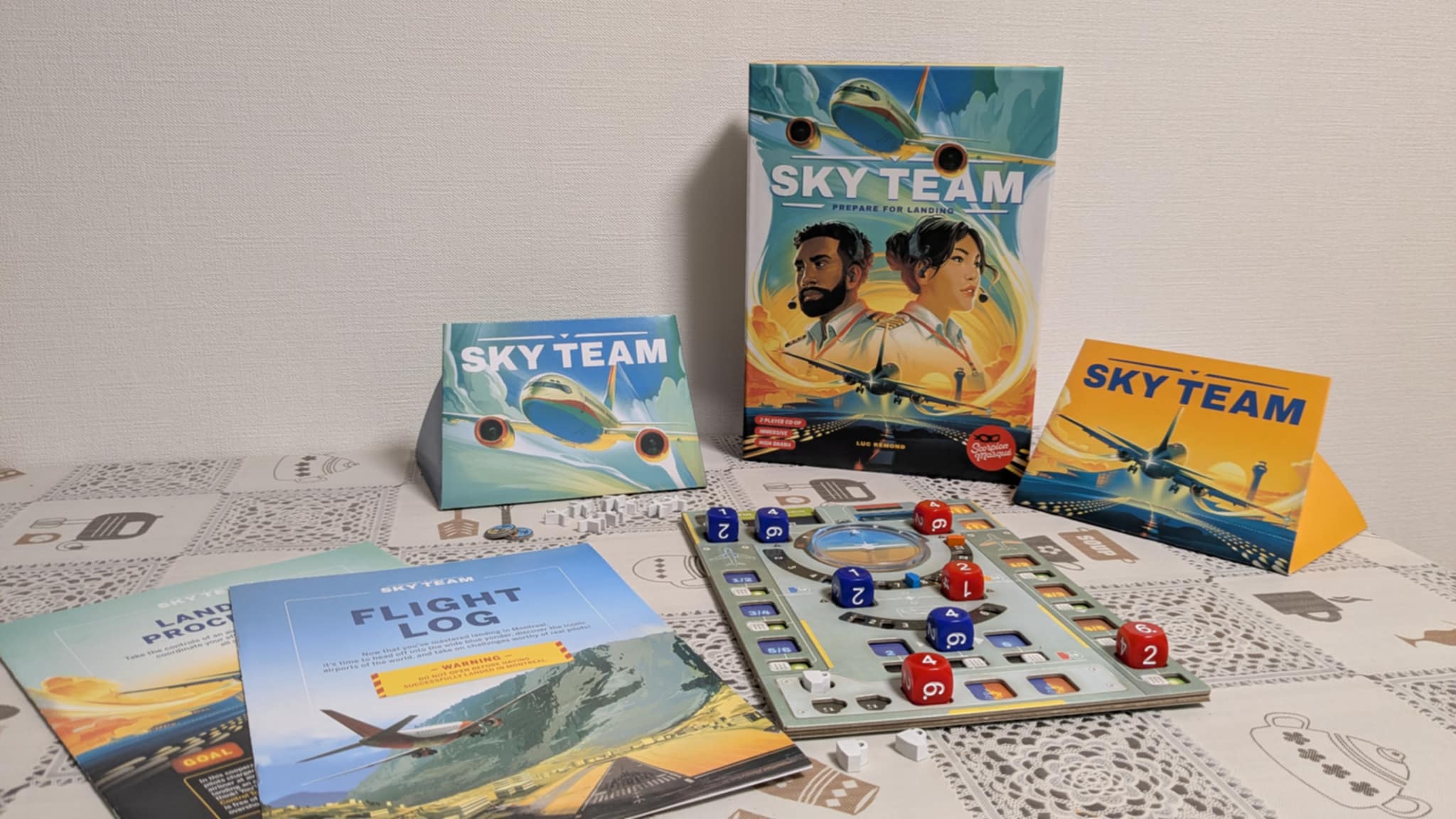Scout Card Game Review
Today, we’re joined by one of Japan’s most innovative small box board games—Scout. From the quirky minds at Oink Games, Scout is a ladder climbing card game that flips tradition on its head, quite literally. Designed by Kei Kajino, this Japanese card game invites players into a colorful circus-themed world, packed into a box smaller than most smartphones but bursting with clever mechanics and tension-filled decisions.
What is Scout?
At its core, Scout is a competitive ladder climbing game, where players take turns playing stronger card combinations than the last—or they “scout” a card to improve their hand. But here’s the twist: your hand is locked in place. You cannot rearrange your cards. Each card has two numbers—one on each end—and you choose which orientation to hold your hand at the beginning of the round. As the game progresses, you must work with the exact sequence of cards you’ve got, only adding new ones in specific positions when scouting.
That simple restriction turns every decision into a tense puzzle. Should you play a weaker combo just to clear space? Should you scout for better potential plays? Every move is a gamble, and the circus theme adds a delightful flair to the mental gymnastics.
- Player Count: 2–5 players
- Playtime: 15–20 minutes
- Complexity: Light
- Mechanics: Ladder climbing, hand management, card drafting
- Theme: Circus performance
Compact, strategic, and endlessly replayable, Scout is a brilliant example of modern Japanese board game design. Now let’s welcome it into the spotlight and see what this daring little card game has to say for itself!
A Small Box with Big Personality
Me: Please give a warm welcome to today’s guest—Scout, the ladder climbing sensation from Japan’s beloved Oink Games. Scout, your box might be small, but your reputation is pretty huge these days.
Scout: Oh, stop, you’re making me blush—if I had cheeks. But yes, I do pack a punch. You’ve heard of Deep Sea Adventure, right? Insider? I’m from the same family, just a bit more competitive and a lot more colorful.
Me: And people are calling you the best Oink game yet. Care to comment?
Scout: Well, I wouldn’t say that too loudly around the others, but… yeah. I’ve climbed a few ladders myself. The thing is, Oink doesn’t just publish games—they craft experiences. Open one of our boxes, and it’s like popping the lid off a can of Japanese design brilliance. Sleek, clean, and always portable.
Me: Speaking of which, your box is tiny but everything fits in surprisingly well.
Scout: You’re not wrong. Some of my siblings—love them dearly—require a minor miracle to re-box. But I like to keep things elegant. Slide me open and you’ll find thick, dual-numbered cards with a satisfying finish, bright tokens that actually pop on the table, and a rulebook that gets to the point faster than a ringmaster’s whistle.
Me: You sound like a true professional.
Scout: I take pride in it. I may be a circus-themed card game, but when it comes to production value? No clowning around.
Me: A strong start to this Scout card game review—let’s dive deeper into what makes you so fun to play.
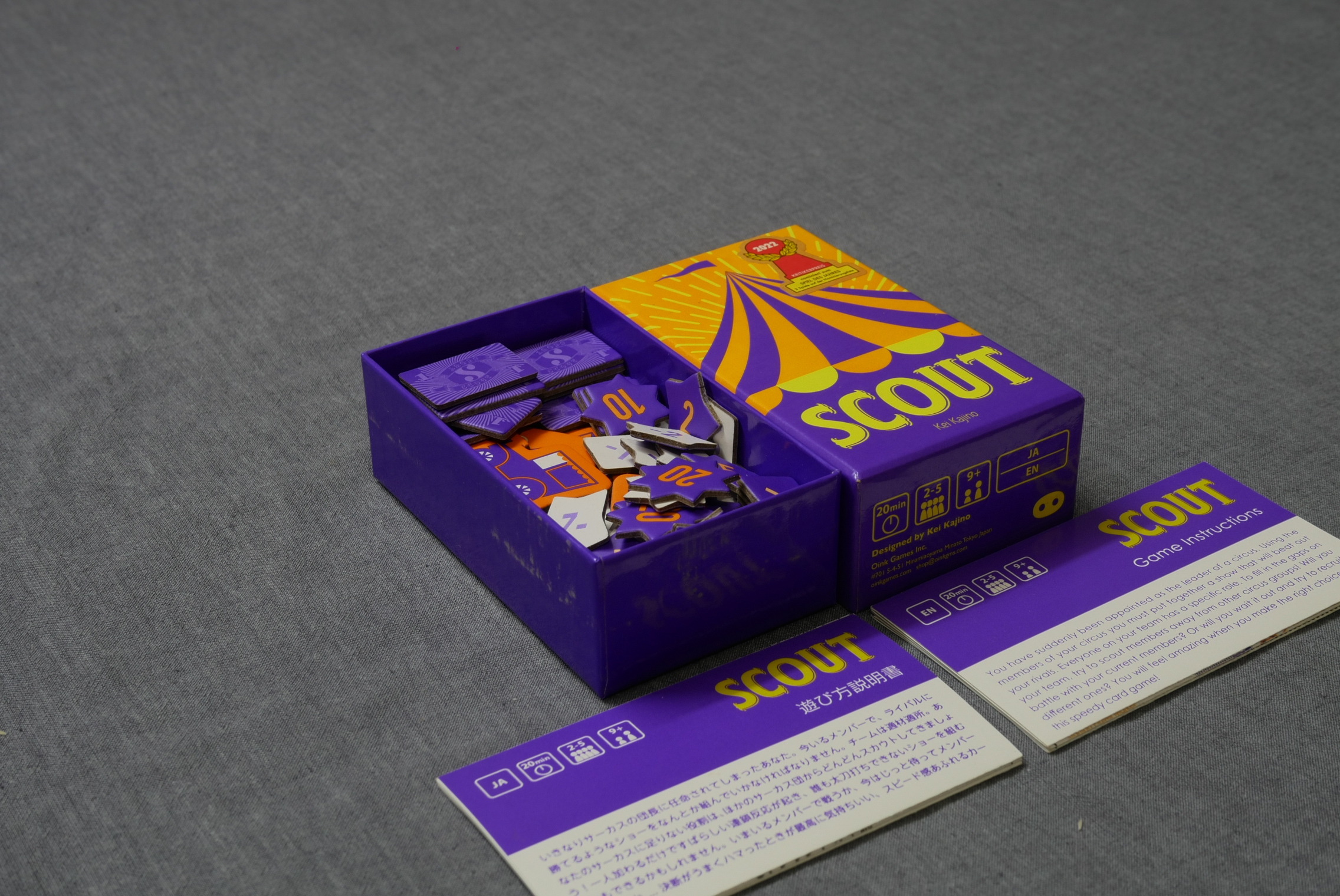
Scout with A Clever Twist Right from the Start
Me: So, the production is sleek and smart—but tell me, Scout, how does that strong first impression carry into the gameplay?
Scout: Oh, I’m immediate. No drawn-out setup, no fiddling with hands, no long rules recitation. You open the box, deal the cards, and boom—you’re already thinking.
Me: Let’s talk about that very first moment—players looking at their hand for the first time.
Scout: Ah yes, the moment of upside-down enlightenment. I deal each player a hand, but here’s the twist—you can’t rearrange the cards. What you see is what you play, and you’ve got to work with the sequence you’re given. But—and here’s the kicker—you get to choose which side of the cards you’ll use.
Me: That’s such a fun surprise the first time.
Scout: Exactly! Both sides of my cards have different numbers, so players get to rotate their entire hand and choose the version that’s most promising. It feels like a little secret puzzle. And because that choice is private, even if you pick the “wrong” side, it still feels like your decision.
Me: That makes the start of the game not only intuitive but immediately engaging.
Scout: That’s what I aim for. Right from the jump, I want players to feel clever, curious, and just a little bit smug about their sneaky-good starting hand. It’s a fantastic way to ease into the flow of the game—sharp, fast, and surprisingly strategic.
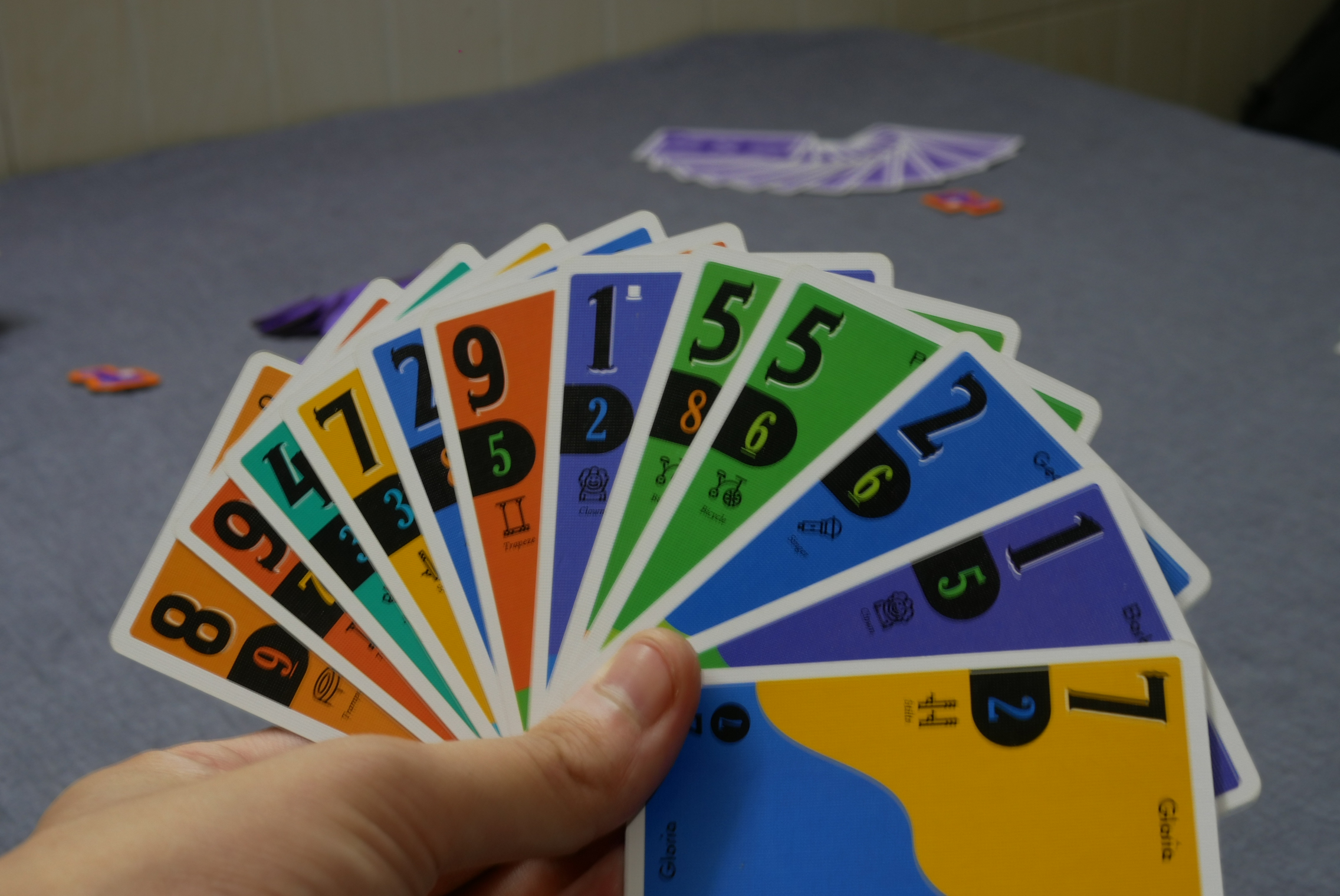
A Card Game That Makes You Feel Brilliant
Me: You’re really winning me over, Scout. That opening decision is great, but the real magic—how do you keep players feeling clever round after round?
Scout: Oh, I live to make people feel smart. Every move you make with me is a tiny triumph. Take a card from the center display? That’s a point. Use it to upgrade your set? Now we’re talking. Slide it in the right spot? You just engineered a future power move.
Me: That constant drip of satisfaction—how do you manage that?
Scout: It’s all about momentum. When a player Scouts a card—grab one from the display and slide it into their hand—they’re shaping their future moves. Maybe they’re fixing a weak spot, or maybe they’re setting up for a massive combo later. Either way, it’s progress, and progress feels good.
Me: And when you Show…
Scout: Ah yes, the big moment! When you finally Show your set—play a stronger combo than the last one on the table—it’s fireworks. You get points, you block your opponents, and sometimes, you set up the next round too. Even better, when someone Scouts from your play? You get a bonus point for being so darn impressive.
Me: That’s the brilliance, isn’t it? Scout keeps rewarding every little action.
Scout: Exactly. I’m designed to be fast, fun, and full of feel-good moments. Whether you’re sneaking in a smart pickup or pulling off a bold Show, I make sure every play feels like a win.
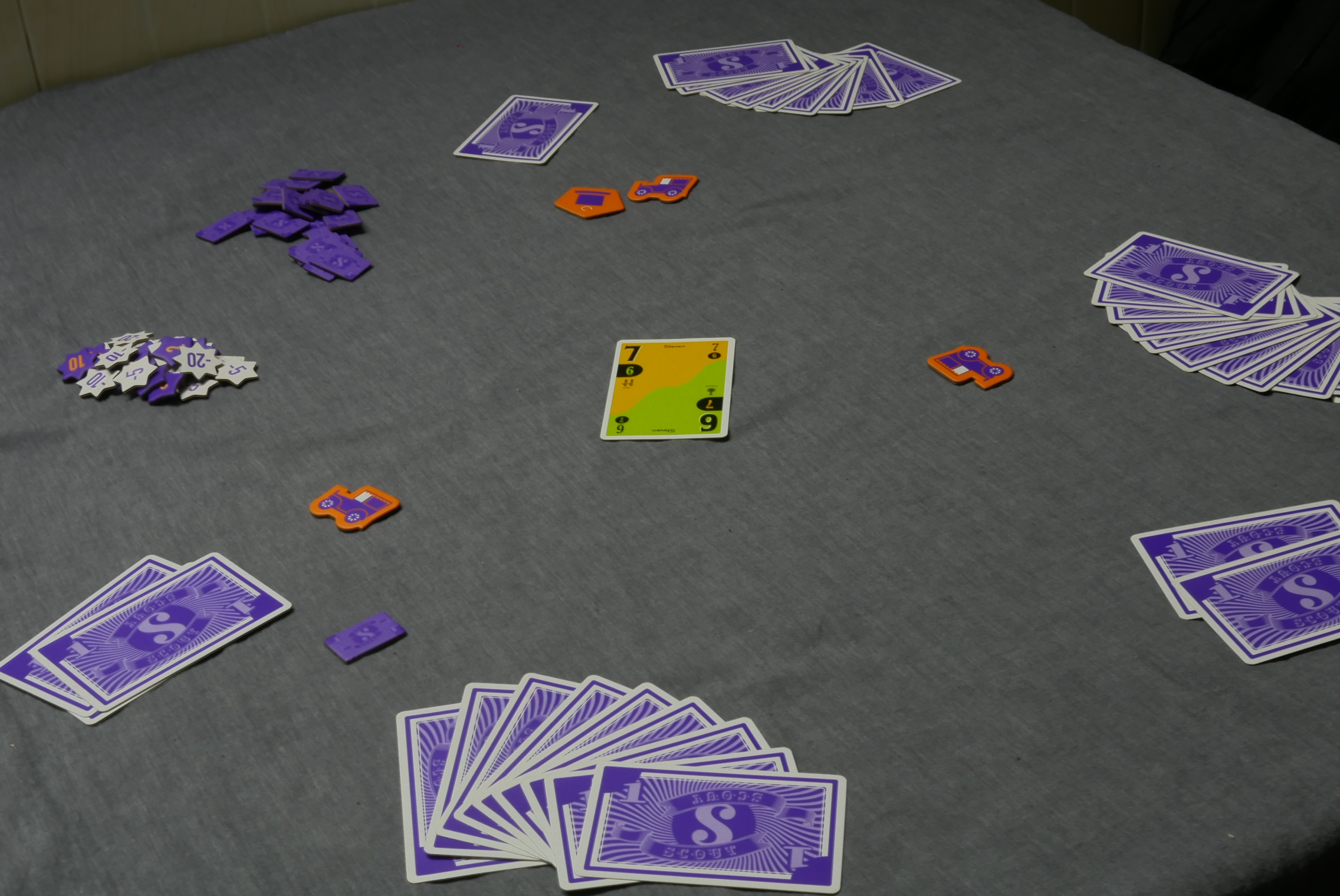
The Power Play: Mastering the One-Time Scout & Show in Scout
Me: Let’s talk about that third action—the mythical, the mighty, the once-per-round Scout and Show. What’s the story there?
Scout: Ah, my prized move! It’s the moment that turns a solid hand into a legendary play. On the surface, it seems simple: Scout a card into your hand and immediately Show a powerful set. Boom—points and prestige.
Me: But it’s not just about the flex, right?
Scout: Not at all. Timing is everything. You see, when a player Scouts from a set, it weakens that set, making it easier for the next player to beat. Normally, the next person benefits from your Scout. But with Scout and Show, you get to beat that weakened set right away. It’s not just clever—it’s ruthless.
Me: And that one token for it?
Scout: That’s the beauty of restraint. You only get to do it once per round. One chance. One special token. It forces players to think: Is this the moment? Should you go big now and end the round—or hold back and wait for something even more devastating?
Me: It really does create tension.
Scout: Absolutely. And the first time someone pulls it off, they light up. It’s like their first free gem-grab in Splendor. Once you Scout and Show, you’re hooked.
Me: So, one action. So many layers.
Scout: That’s how I roll. I might be a fast-paced ladder climbing game, but I’ve got depth. Scout isn’t just about cards—it’s about perfect moments.
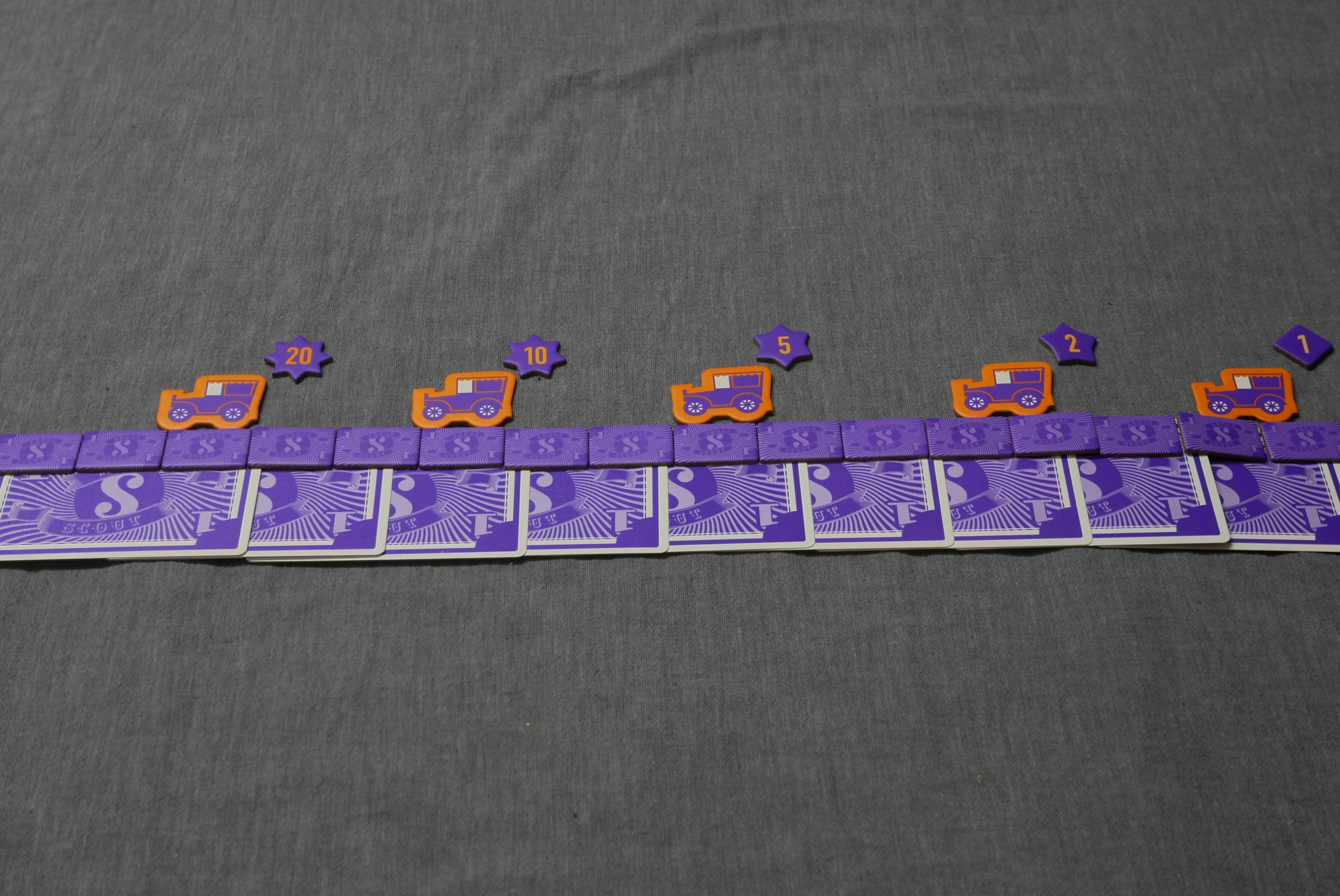
Scout Makes You Love Watching Other People Play
Me: One thing I’ve noticed—Scout isn’t just fun on your turn. Why is that?
Scout: Ah, now you’re touching on what separates a good game from a great one. A good game makes you care about other people’s moves. But a great game? It makes you excited for other people’s turns.
Me: And you think you’re in the latter category?
Scout: Without a doubt. See, every move made affects everyone else. When a player plays a set, those cards are now out of the system. Maybe you were building a 5-card run, and suddenly someone just threw out the number you needed in the middle of it. That’s drama. That’s delicious tension.
Me: So you’re always paying attention?
Scout: You have to. And not just because of the card pool. When someone Scouts, they’re pulling from the ends of a set. If they weaken the display, you might be next in line to take it down—or benefit from the new configuration. And if the person to your right Scouts? You’re watching especially closely. They just changed the board state for you, and possibly handed you a golden opportunity.
Me: Sounds like it keeps everyone engaged.
Scout: That’s the point. I’m a compact, fast-paced Japanese card game—but I deliver full-table engagement from the first play to the last. Whether you’re playing or watching, you’re always in the action.
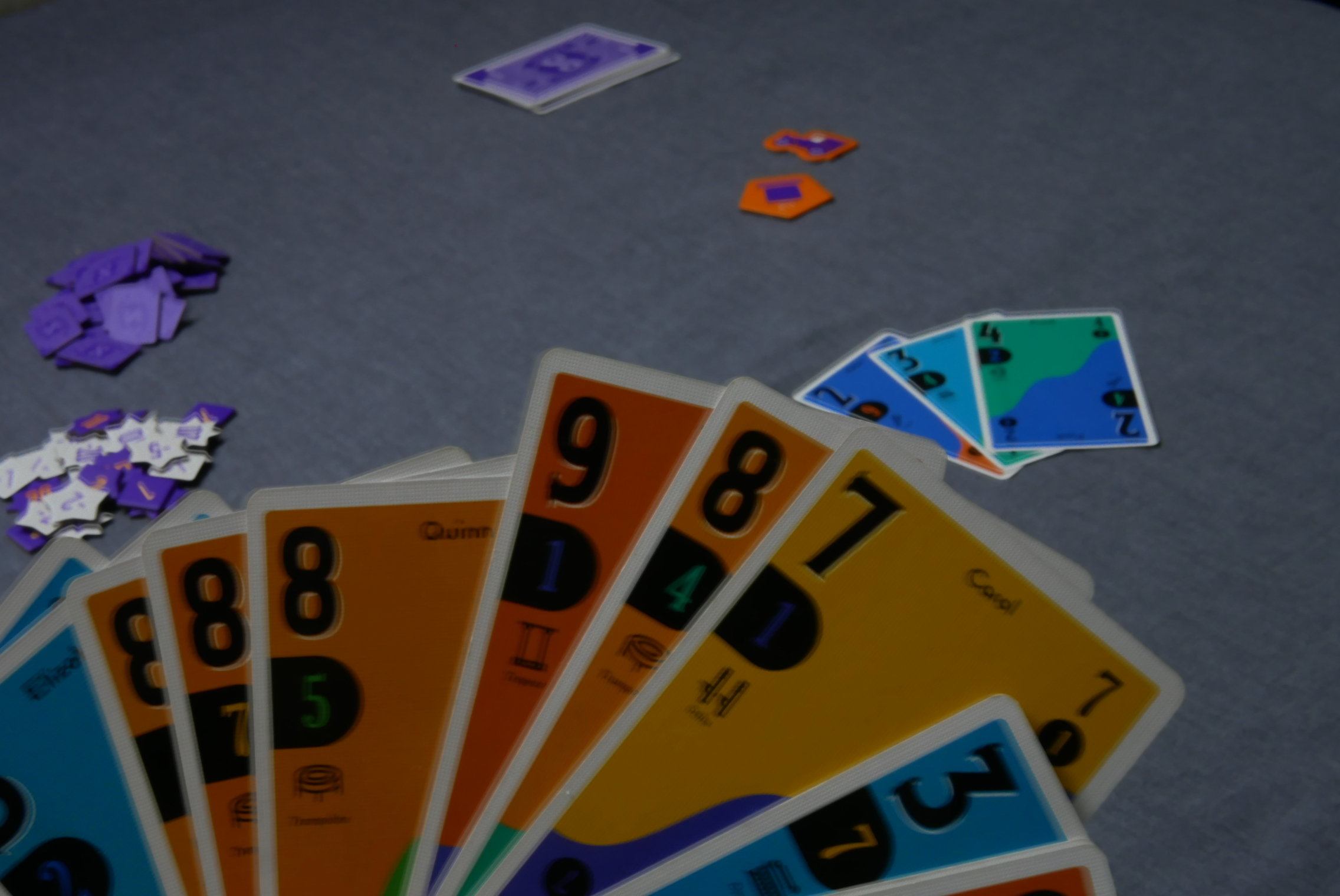
Scout: Simple, Smart, and So Much Fun
Me: Normally, I’d ask you about drawbacks around now—but to be honest, I’m struggling to find any.
Scout: That’s very kind of you! And honestly? I won’t pretend to be flawless—but I am exactly what I say on the box.
Me: If someone really wanted to nitpick?
Scout: Maybe the theme? I’m called a “circus” game, but that’s more aesthetic than anything. I don’t try to immerse you in big top drama. I’m here to be a fun, fast-paced ladder climbing card game. If you’re looking for narrative immersion, I’m not your guy—but if you want a good time? I’ve got you covered.
Me: And the randomness?
Scout: Fully upfront. Everyone gets a random hand at the start, but that’s it. No surprises, no swings of fate mid-game. Because of that, even if you lose, it never feels punishing. You were dealt a hand, you made the best of it, and maybe next time you’ll do better. It keeps things light and pleasant.
Me: So you’re saying you’re a card game that makes fun the priority?
Scout: Absolutely. I reward players for doing fun things—scouting clever cards, dropping powerful sets, and pulling off satisfying combos. I’m smart enough to be strategic and tactical, but simple enough to enjoy with friends while chatting about something else entirely. If “smart, simple, and fun” is your jam, then I’m your deck.
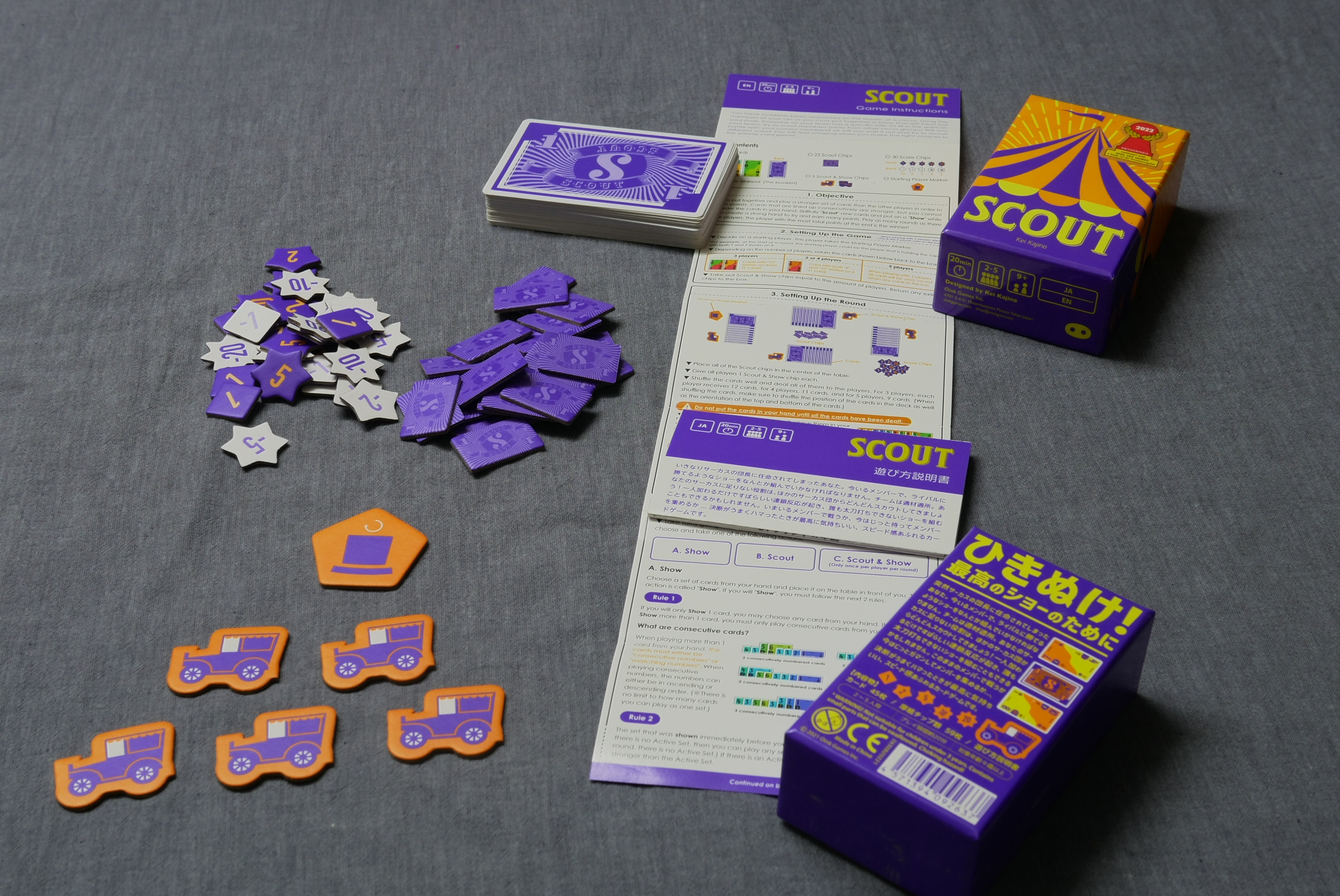
Final Verdict: Scout Is a Perfect Card Game
Me: Scout, it’s been a real treat having you here today.
Scout: The pleasure was all mine. Always happy to be shuffled into the spotlight.
Me: Before we wrap things up—any final thoughts?
Scout: Just this: I’m simple, but not shallow. Light, but not forgettable. I bring people together, make them laugh, and keep things snappy. What more could a card game hope to be?
Me: Well said. Honestly, Scout is one of the best modern card game designs out there. A masterclass in how to combine elegant mechanics with joy-inducing gameplay. Whether you’re a veteran board gamer or introducing someone new to the hobby, Scout is an absolute slam dunk.
Scout: You flatter me.
Me: Not at all—just calling it like I see it. Thank you, Scout, for bringing so much fun in such a compact little box. Until next time, shuffle safe.
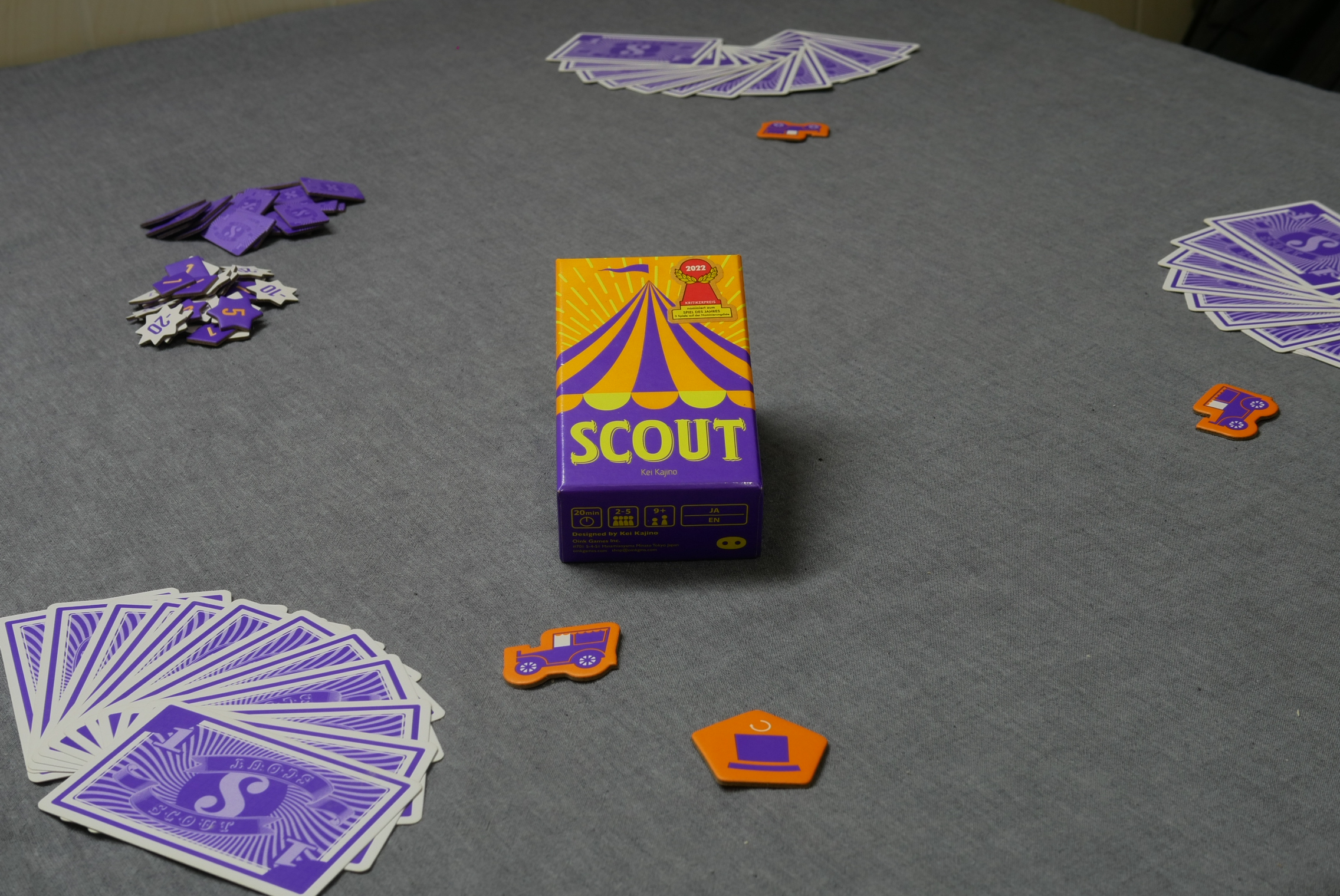
Conclusion
Scout is everything a modern card game should be—immediate, clever, and packed with the kind of satisfying gameplay that makes you want to reshuffle and go again. It feels both nostalgic and fresh, channeling that unmistakable card game energy with refined, contemporary design choices that reward smart play without ever overstaying its welcome. It’s a delight in the truest sense.
If you’re looking to explore further, Startups is another brilliant Oink game with a totally different tempo but the same punchy fun. Want something more focused and intense? Lost Cities is a two-player classic with tactical depth. For a louder, sillier vibe, 6 nimmt! delivers chaotic joy in spades. For a more quiet, brainy vide, Nana is another excellent Japanese card game you have to check out.
Whether it’s your first step into Japanese small box games or your fiftieth, Scout is a must-play.
Final Rating: 10/10
✅ Pros:
Instantly engaging, right from the first hand
Clever decisions packed into every turn
Captures the classic “card game” energy with modern polish
Easy to teach, fast to play, endlessly replayable
❌ Cons:
None—Scout knows exactly what it is, and what it is… is one of the best modern card games.

